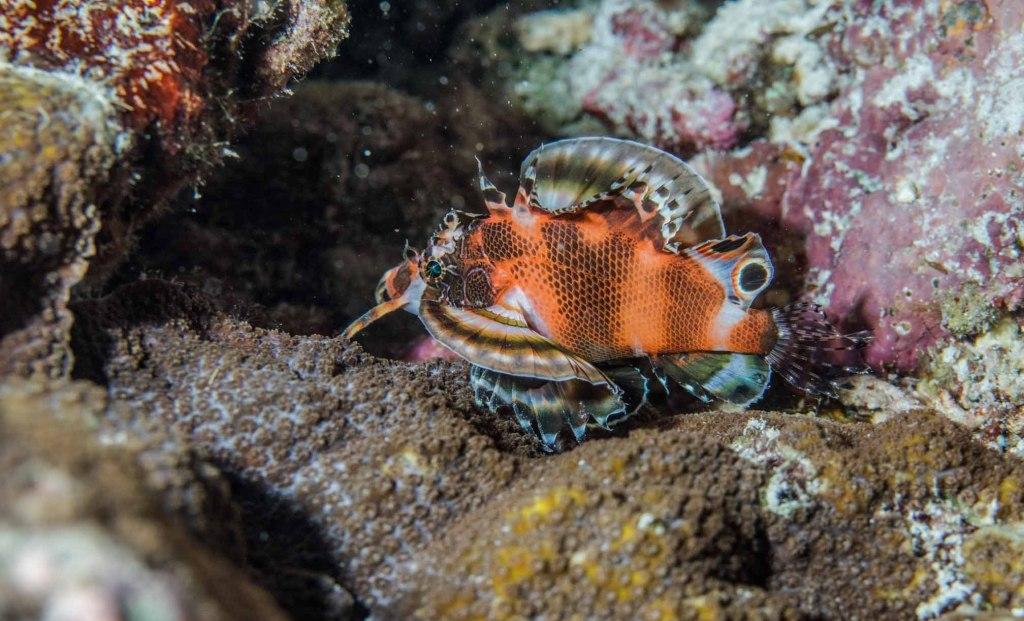Scorpionfish, belonging to the chordate phylum rayfin family Scorpiopodidae, commonly known as lionfish, mainly living in the Indo-Pacific Ocean waters, is a popular marine ornamental fish in recent years. They are brightly coloured and oddly shaped, and are prominently distinguished by distinct warning colors such as red, white or black stripes, brilliant pectoral fins and venom-secreting fins. When the lionfish swims and forages in the sea, its wide pinnate pectoral fin and extended dorsal fin will swing leisurely, just like the flag on the back of Wusheng in Peking Opera, which is majestic and graceful.
The common lionfish in China are the double-spotted short-fin scorpionfish, the spotted shortfin scorpionfish, the tentacled scorpionfish, the radial squid, the devil scorpion and so on.

Biocular spotted short-finned scorpionfish
Spotted short-finned scorpionfish
Tentacled scorpion
Spokes
Devil's Scorpion
Form and habits of life
The lionfish is 5 cm to 45 cm long and weighs 25 to 1300 g, and can live for 5 to 15 years, mainly preying on small fish and crustaceans. Lionfish are extremely adaptable to the environment and can live in a variety of salinity, temperature and depth of the sea, found in coral reefs, lagoons, rocky substrates, and sometimes in turbid offshore and port areas.
Lionfish swim underwater or hide behind reefs during the day, and at night they become skilled hunters, when approaching their prey, they will spray water to confuse the prey and disorient the prey, at the same time, their swinging pectoral fins are like a barrier, restricting the activity of the prey and driving it to a narrow corner. In addition, lionfish will use specialized muscles on both sides of the body to accurately control their position in the water body, so as to better attack the prey, and then expand the pectoral fin to swallow the prey. In addition, the water jet of the lionfish will also change the direction of action of the prey, so that the small fish are forced to turn to the lionfish and become prey, thereby improving the feeding efficiency of the lionfish.
Undersea "Poison King"
Lionfish are among the most toxic fish in the ocean and pose a threat to both fish and humans in the sea. With the exception of moray eels, some groupers and sharks, which prey on lionfish, adult lionfish have few natural predators, which is inseparable from the stingers on their bodies. Lionfish have venomous glands at the base of their fins, pectoral fins, and fins, and poisonous needles at the tips of their fins, which cannot be easily approached by predators when the fins are spread. When the lionfish feel threatened, they will first retreat, ready to attack, when violated, they will sting into the body of the offender, the stinger located at the root of the stinger will be squeezed and then released through the stinger, causing harm to the aggressor. However, even the most powerful creatures have weaknesses, because the lionfish's abdomen is not protected by spines and is vulnerable, so they are accustomed to perching in the shade of the reef when resting, and stick themselves to the rock wall with suction cups in their abdomen to protect themselves.
When humans are accidentally stung by the stinger of the lionfish, the wound will be swollen and accompanied by severe pain, but also may produce nausea, vomiting, fever, breathing difficulties, convulsions and other reactions, for healthy adults, the venom of the lionfish is generally not fatal, but for young children, the elderly, people with weak immune systems or people who are allergic to the venom of the lionfish, in rare cases, it may cause temporary paralysis of the limbs, heart failure, etc., for severe allergies, and even life-threatening. Therefore, after being stinged by a lionfish, you should seek medical attention as soon as possible, if the wound is not treated in time, it may cause a series of sequelae.
Image source: Fish Catalogue of Coral Reefs in the Nansha Islands
Source: Field Scientific Observation and Research Station of Coral Reef Ecosystems in Nansha, Ministry of Natural Resources
Editor-in-Charge: Song Xi